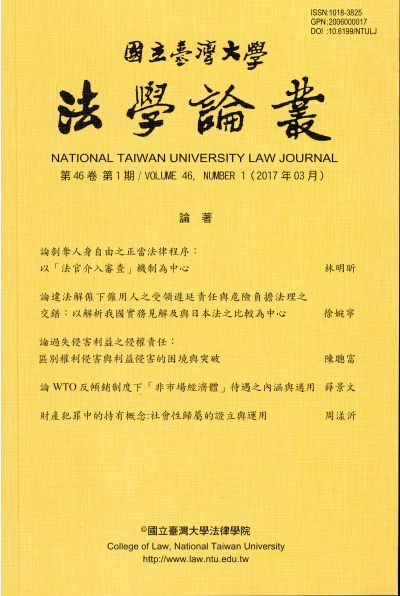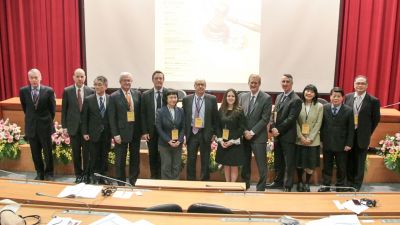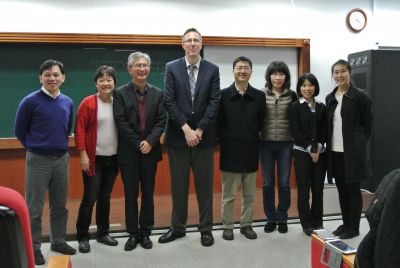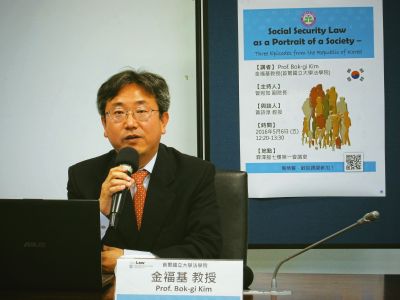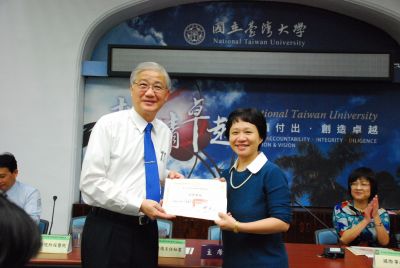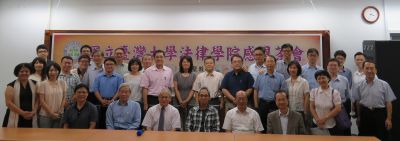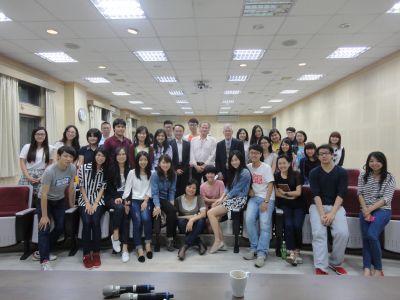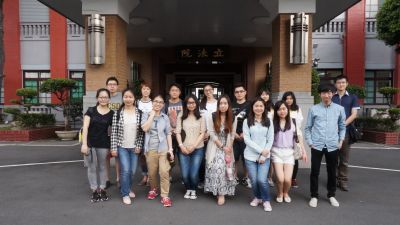Special Columns (33)
National Taiwan University Law Journal March 2017 Volume 46, Number 1
National Taiwan University Law Journal
March 2017 Volume 46, Number 1
Articles & Abstracts
Ming-Hsin Lin, Professor of Law, College of Law, National Taiwan University.
The Due Process Requirements for the Deprivation of Physical Freedom: Focusing on Judicial Intervention
Albeit Article 8 of the Constitution guarantees the physical freedom of a person, the scope of due process requirements thereof remains a controversial issue in both the academic discussions and legal practices.This paper argues that although the due process requirements provided in Article 8 of the Constitution apply admittedly to criminal defendants, the requirements shall apply to non-criminal defendants by analogy.For a specific institutional design, this paper comments upon that the newly-amended Habeas Corpus Act, and makes suggestions in response to jurisdiction and review process for future reference.
--------------------------------------------------------------------------------------------------------------------------------------------------------------------------
Wan-Ning Hsu, Associate Professor of Law, College of Law, National Chengchi University.
Employer’s Delay in Acceptance or Risk of Loss in Unlawful Dismissal Cases: A Comparative Study on Japan, and the Judicial Decisions of the Civil Code §487 in Taiwan
If an employee has not performed his or her promised work, he or she will not have a claim for remuneration, which is so-called the doctrine of no-work-no-pay. However, the Civil Code §487 is the exception of the doctrine of no-work-no-pay. On the other hand, according to the Civil Code § 267, where “performance of the service is impossible”, the existence of the employee’s right to demand for his remuneration depends on whether the impossibility is “attributable to the employer”. Thus, how to distinguish the employer’s delay to accept the performance tendered to him from the impossibility of the employee's performance is an important issue because it will decide if the employee has the right to claim for remuneration. Through an analysis of the Japan experiences and the reflection on the judicial decisions of the Civil Code §487 in unlawful dismissal cases in Taiwan, this research will focus on the controversial issues, such as when the employer delays accepting the performance and if the employee still has to tender the performance, and try to solve them by the doctrine of risk of loss.
--------------------------------------------------------------------------------------------------------------------------------------------------------------------------
Tsung-Fu Chen, Professor of Law, College of Law, National Taiwan University.
Tortious Liability on Negligent Infringement on Interests: Dilemma From and Breakthrough For the Distiguishment of Infrigement on Rights and Interests
Article 184 of Taiwan Civil Code follows the model of German Civil Code, establishing the tort liability through the distinction between the infringement on rights and the infringement on interests, which has been confirmed by recent Taiwan Supreme Court judgments although it is debatable on this issue from academics in the past. Following this distinction, it raises an important issue about the requirements to impose a tort liability on the tortfeasor when he negligently, rather than intentionally, infringes upon the interests of another. This paper explores the ways in which German law deals with such cases, including the broad interpretation of the “rights” elucidated under article 823 (1) of German Civil Code and the establishment of a theory of the protection for a third party to a contract. This paper suggests that, in addition to expand the scope of the concept of ‘right’ protected by the tort law in appropriate cases, it is desirable to utilize the second sentence of article 184 (1) of Taiwan Civil Code to deal with those controversial cases of negligent infringement on the interests of another.
--------------------------------------------------------------------------------------------------------------------------------------------------------------------------
Ching-Wen Hsueh, Assistant Professor, Department of international Business, National Chengchi University.
The Content and Application of NME Treatment under WTO Agreement
The domestic markets of communist courtiers were controlled by the governments and do not play by the rules of market. Therefore, it is questionable whether the investing authorities still have to take the domestic normal value as the basis for comparison. Thus, in this paper’s section I, the origin of the NME treatment is elaborated and legitimacy and necessity of such treatment is analyzed. Section II tried to discover the criteria of the NME status, which were never clearly provided in the WTO anti-dumping rules, by referring to the relevant provisions, objects and purposes of the anti-dumping rules, and the practices of the members. Section III focused on the methodologies to determine the normal value in NME. By virtue of the findings in the previous sections, the “surrogate mode”, which is the most widely adopted methodology to determine the normal value in NME, is the be reviewed in the last section.
--------------------------------------------------------------------------------------------------------------------------------------------------------------------------
Yang-Yi Chou, Associate Professor of Law, College of Law, National Taiwan University.
The Concept of “Possession” in Criminal Law
The purpose of this article was to clarify the concept of possession in criminal law, which plays a key role in discussing the offences against personal property. The author argued that possession can be defined as the possibility to use things, which is recognized under the social viewpoint. Therefore, possession appears as a social institution. The social viewpoint has the function of orientation, which helps people to decide how they treat objects in daily life. Its legitimacy comes from the voluntary participation of individuals in this institution.
2017/3/9 International Symposium on IP Licensing and Competition Laws
The International Symposium on IP Licensing and Competition Laws hosted by College of Law, National Taiwan University (NTU) took place on March 9 in Taipei, Taiwan inviting experts and scholars from the US, EU, Japan and Taiwan to have rational debates over the regulatory relationship between IP licensing and competition laws, which has been a frequent issue of international contention in recent years. Speakers and panelists who participated in the symposium respectively expressed their unique opinions from different perspectives in economics, law and practical operation. The symposium hence served as a venue for them to find their common grounds on these issues and to propose possible solutions for the relevant domestic authorities' reference to future implementation of policies and application of laws.
University of Maryland Professor Frank Pasquale Serial Lectures
University of Maryland Professor Frank Pasquale Serial Lectures
Date: March 6, 2017
Time: 2:00-4:00 pm
Venue: Tsai Lecture Hall Room 1301
Keynote speaker: Professor Frank Pasquale (The University of Maryland Francis King Carey School of Law)
Moderator: Professor Ming-Yan Shieh (National Taiwan University College of Law)
Professor Frank Pasquale specializes in the area of information law and has achieved excellent research results on information and financial technology law. We are honored to invite Professor Pasquale this time to discuss the increasingly important information privacy issues with the professionals in Taiwan with a view to broaden the horizon of Taiwan’s academic research.
There would be three lectures delivered by Professor Pasquale focusing on the impact of professional service providers from the development of technology which are the subjects “A Rule of Persons, Not Machines” and “Workshop on big data and health privacy issues: The Law and Policy of Predictive Analytics in the Learning Health Care System (and Beyond)” in Institutum Iurisprudentiae, Academia Sinica and the subject “Laws of Robotics: The Future of Professionalism in an Era of Automation” in NTU Law.
Professor Bok-gi Kim discusses social security law of the Republic of Korea
Professor Bok-gi Kim from the School of Law at Seoul National University (SNU Law) gave a speech at NTU Law on the topic: “Social Security Law as a Portrait of a Society –Three Episodes from the Republic of Korea.” Professor Kim explained the Korean social security law from three aspects: public assistance, social insurance, and social welfare. He then focused on the aspect of public assistance, and raised three key issues faced by the Korean society today.
The first issue is “lonely death.” Professor Kim pointed out that the traditional value of looking after the elderly is declining in the society. He subsequently explained the circumstances under which families are required to take care of their elderly, in accordance with the Korean laws protecting the fundamental right to survival.
The second problem is “the aging society.” According to Professor Kim, Korea now faces the challenges of an aging population, low birth rates and slow economic growth, all of which call for a sustainable social welfare system. He suggested the government to reform the national pension system and encourage child birth, as well as take the initiative to provide elderly care and promote youth employment. However, there are certainly obstacles to overcome. Reforming the pension system may lead to fiscal crises, violate the constitution, or restrict the freedom of legislation. To address youth unemployment, Korea has passed an act, which mandates that at least 3% of the employees hired by the government-owned organizations should be formerly jobless young people. This act, however, faced a constitutional challenge. The court eventually decided that it does not conflict with the constitution as it aims to promote economic growth and social security.
Finally, Professor Kim mentioned the issue of “affirmative action,” discussing the concepts of substantive equality and reverse discrimination. The example he raised was the Korean act protecting the right to employment of the visually impaired. Under this act, only those with visual impairments are qualified for the massage therapist certification. There were constitutional disputes over whether this act violates people’s right to free choice of employment. The court, however, decided that this act is constitutional in 2008. The reasoning behind the ruling is that massage therapist is the only possible occupation for the visually challenged, and thus the act can protect their livelihood as well as achieve substantive equality.
How is the Korean society going to meet all these challenges? Professor Kim believes that the government should first address the problems of polarizing age groups of the Korean population, and further establish a social welfare system that is sustainable in an aging society. The speech ended with an interesting discussion between Professor Kim and the panelist Professor Sieh-chuen Huang on the challenges faced by families in Taiwan, Korean as well as many other countries with an aging population.
College of Law ranks third of institute level group
| Category | College | Department | Rank |
| University level | Office of International Affairs | 1 | |
|
University level |
NTU Library | 2 | |
|
University level |
Computer and Information Networking Center | 3 | |
|
Institute level |
NTU Hospital | Hospital | 1 |
|
Institute level |
College of Liberal Arts | Foreign Language Teaching & Resource Center | 2 |
|
Institute level |
College of Law | College of Law | 3 |
|
Department level |
College of Liberal Arts | Department and Graduate Institute of Library and Information Science | 1 |
|
Department level |
College of Electrical Engineering and Computer Science | Graduate Institute of Electronics Engineering | 2 |
|
Department level |
College of science | Department of Chemistry | 3 |
|
Department level |
College of science | Department of Geosciences | 4 |
|
Department level |
College of Engineering | Department of Material Science and Engineering | 4 |
|
Department level |
College of science | Department of Phychology | 4 |
|
Department level |
School of Pharmacy | School of Pharmacy | 4 |
|
Department level |
College of BioResources and Agriculture | Department of Entomology | 4 |
|
Department level |
College of Electrical Engineering and Computer Science | Graduate Institute of Communication Engineering | 4 |
Retirement Party!
Retirement Party!
This emotional event took place on Wednesday afternoon Sep. 30th, 2015, attended by special guests from all walks of life so as to give thanks to retired Prof. Keh-chang Gee, Prof. Jung-chien Huang, and Prof. Ming-cheng Tsai, an incumbent Justice of the Constitutional Court, for their many years of contribution to the College of Law.
Dean Sheng-lin Jan remarked everyone was ready to dedicate their whole life to their career when picking up one. More so as teachers. Here we had three teachers who really gave up their most precious part of life to the College. Retired as they were, they would keep caring about the faculty and students wherever they were bound into their future life.
Guest Address I
Prof. Huang from National Chung Cheng University briefed Prof. Gee’s many contributions to Tax Law studies, including basic legal concepts of taxes, principles of Tax Law, the development of Tax Law studies and the foundation of its academic significance. Prof. Huang anticipated others could take up the endeavors in the field of Tax Law studies to complete the establishment of Fiscal Court, and to realize the protection of taxpayers’ rights and the due process of Tax Law. Accountant Huang said he admired so much Prof. Gee’s relentless effort.
Lawyer Eric Tsai showed his gratitude for Prof. Gee’s years of cultivating and building, which enabled Administrative Court to establish principles of Tax Law. He hoped Prof. Gee could keep on assisting and leading so that the education, legislation, and judgment quality could stay constantly improved.
At last, Mr. Jong expressed thankfulness to Prof. Gee on behalf of all his students.
Prof. Gee’s Retirement Speech.
He particularly gave thanks to Prof. Tez-Chien Wang, Prof. Hong-Si Lee, and Prof. Yueh-Shen Weng for their concern and encouragement, which were crucial to the perseverance of his teaching and researching.
Guest Address II
Prof. Mau-sheng Lee talked of anecdotes which happened when he and Prof. Jung-chien Huang travelled around Japan and Taiwan together. Those anecdotes implied Prof. Jung-chien Huang’s noble character outside teaching and researching.
Prof. Huang’s Retirement Speech
Prof. Huang talked about the feeling and experience he had had since his retirement this August. He wished everybody plain sailing on the boat of time.
Guest Address III
Prof. Sheng-lin Jan ‘’reported’’ Prof. Ming-cheng Tsai was incredibly kind to Tsai’s mother and mother-in-law and always easygoing to people. Prof. Wen-yeu Wang praised Prof. Tsai was really open-minded, prudent, and loyal during his 2 terms as Dean of the College of Law.
Prof. Tsai’s Retirement Speech
Prof. Tsai was grateful to all the teachers, and hoped everybody could stay in touch.
This retirement party ended up in a sentimental yet somewhat joyful atmosphere. Three teachers had cultivated a number of excellent students and been loved and respected by them. College of Law couldn’t be more thankful to them three. We wished them every happiness and expected them to keep on communicating with the faculty and students in hopes that fresh lawyers would still have the chance to learn from them.
Doug Pardue, Reporter for 2015 Pulitzer Prize -Winning Series
On Tuesday, April 28, American reporter Mr. Doug Pardue was invited to give a speech to us at the NTU Law School. Mr. Pardue wrote a series of report “Till Death Do Us Part” with other reporters from “The Post and Courier” newspaper office. “Till Death Do Us Part” is related to domestic violence, which had won the 2015 Pulitzer Prize Gold Medal Award for Public Service.
There were two speeches given by Mr. Pardue with different themes. The first theme was “Journalism and the American Criminal Justice System”, which was hosted by our visiting professor Samuel Wilson and joined by Charles Wharton. Mr. Pardue discussed about how reporter can use his reports to evoke the social consciousness when the law enforcement officers and the crime justice system failed to function properly on domestic violence problems.
The other speech was held jointly with The Graduate Institute of Journalism and was hosted by their chairman Ms. Hung. The theme was called “911, Terrorism, War and a Journalist’s Role in Making a Difference”. Mr. Pardue shared how the reports related to 911 attacks put emphasis on “human” and bring out the true meaning behind this tragedy. In addition, there were Q&A session and discussions after the both speeches which generated great feedback.
Exchange Students Visited The Legislative Yuan
March 31st, our department assistant took 17 exchange students to visit The Legislative Yuan of Republic of China. Upon arrival, receptionist guided students to the briefing room to watch a film about The Legislative Yuan, which included an introduction of its organization, composition and current legislators.
Then we passed through the building which was built during Japanese colonial period, and reached the Council Hall which all of us were very excited to see. We intentionally chose to visit on the day that the final general interrogation was held, so exchange students had an opportunity to observe how administrators and legislators interact with each other in a democracy country.
Afterwards, exchange students got permission to sit in the public gallery on the second floor, and the receptionist explained seats allocation of legislators and administrators as well as the meeting progress. She even explained what had happened on the 318 students movement in Legislative Yuan last year.
In Council Hall, the legislators prepared different ppt slides to interrogate the administrators from different departments. In addition to discussing the issue about officials’ allowance in Kinmen territory, there was also an excellent interrogation and defense about whether our country should join the Asian Infrastructure Investment Bank. The legislators addressed their research findings on that issue, including details about what name should we use to join, the investment budget, and benefit assessment, etc.
After the tour finished, some exchange students chose to stay longer in the Legislative Yuan to continue to observe and learn. We truly believed that this visit trip would be a fresh and inspiring experience for them since they all came from countries which implement different political systems.
College of Law and the College of Social Science Reunion
On the relaxing noon of March 18th, College of Law and the College of Social Science held a meaningful reunion together. There were many special guests, teachers, visiting professors and administrative staffs joined this activity to reminisce the pass time in Xuzhou Rd. campus.
As we all know, the connection between College of Law and the College of Social Science is strong. However, to maintain and strengthen the interaction; to facilitate teaching and research cooperation, and to combine our resources, we actively prepared for this reunion. We spent a whole month developing concept of topic, activity content and its details. With limited budget, we finally managed to present a high-quality event that every participant and staff was an eyewitness of a beginning of a new era of collaboration.
This time the event was held by College of Social Science, the next time will be hold in later of this year by College of Law. In the future, we will take turns to hold this event.

